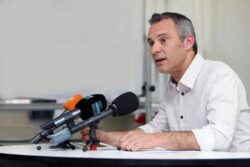``If the employer cannot exercise supervision, additional measures must be taken.``

Michel Peremans – organising Crisis Information and Communications
‘Abductions are a regular event in the world of international aid. And while organisations are certainly aware of the problem, they could prepare better.
I understand the difficulty: it’s an expensive business and courses take a lot of time. But even so, it really is important to be prepared. Once something happens, there’s no more time for thinking or discussions: you just have to act.’
Extensive experience
 Michel Peremans runs courses for CSD in crisis management and international crisis communications. He has extensive experience as a journalist. He was an editor for a range of TV channels for sixteen years, visiting Africa frequently.
Michel Peremans runs courses for CSD in crisis management and international crisis communications. He has extensive experience as a journalist. He was an editor for a range of TV channels for sixteen years, visiting Africa frequently.
After that, he worked for several major non-profit organisations as an advocacy, communications and campaign expert. ‘I joined Médecins sans Frontières in 2006, where I coordinated communications during emergencies and crises, international media relations and collaboration inside the organisation.
I was involved in about fifteen critical incidents with different organisations. That involves sitting in a room for a month with a team of about four people. For example, just after the earthquake in Haiti, we had an abduction.’ For the last five years, he has been an independent trainer and consultant, working for several non-profit organisations.
Being well prepared
‘As an organisation, you simply have to be well prepared. That starts as soon as you send people to a particular country.
South Sudan, for example, is not the easiest country. So you have to be prepared for everything. As an organisation, you should constantly be keeping an eye on what’s happening in that country, for example by monitoring local news.
And you use that as a basis to draw up a plan in case something happens. Where should we go, who do we need, where can we obtain information quickly, etc. If you work as an organisation in several countries, you need to draw up a plan like this for each country.’
Key
The main thing in crisis management is, of course, to get a good result. But crisis response should also prevent knock-on crises that can make a solution very difficult, for example reports or inaccurate news about the case, or families getting angry. That is why ‘information containment’ and ‘information gathering and information management’ are key.
Organisation
‘The training I give focuses mainly on organising the crisis response and communications. When a call comes in, the first questions a crisis team asks are:
is it true? What information is correct? So the process begins with an analysis, decision-making and the development of a strategy. In addition, it must be clear immediately what everybody’s roles and responsibilities are. Only then can you communicate successfully with all the parties you are dealing with.’